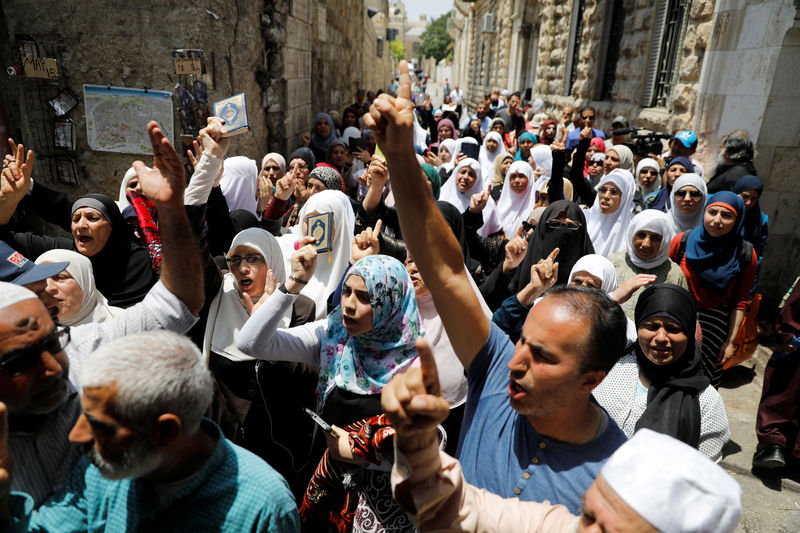By Luke Baker and Ori Lewis
JERUSALEM (Reuters) - Israel bolstered security in the Old City of Jerusalem on Friday and prepared for possible clashes with Muslim worshippers after Prime Minister Benjamin Netanyahu decided metal detectors at a sensitive holy site would not be removed.
There have been daily confrontations between Palestinians hurling rocks and Israeli police using stun grenades since the detectors were placed at the entrance to the shrine, known to Muslims as the Noble Sanctuary and to Jews as Temple Mount, on Sunday, after the killing of two Israeli policemen.
Muslim leaders and Palestinian political factions have urged the faithful to gather for a "day of rage" against the new security policies, which they see as changing delicate agreements that have governed the holy site for decades.
The Israeli police said extra units had been mobilized to bolster security in the Old City, while Muslim access to the shrine for prayers would be limited to women of all ages and men over 50. Roadblocks were in place on approach roads to Jerusalem to stop buses carrying Muslims to the site.
"Police are coordinating to enable Friday prayers to take place and at the same time security measures are taking place," spokesman Micky Rosenfeld said.
The Noble Sanctuary-Temple Mount compound, containing the Dome of the Rock and the Aqsa Mosque, has long been a source of religious friction. Since Israel captured and annexed the Old City, including the compound, in the 1967 Middle East war, it has also become a symbol of Palestinian nationalism.
On Thursday, there were calls for Netanyahu to back down and remove the metal detectors so as not to inflame the situation. Turkish President Tayyip Erdogan, after discussing the issue with Palestinian President Mahmoud Abbas, called Israeli President Reuven Rivlin to press for their removal.
Nickolay Mladenov, the United Nations' special coordinator for long-stalled Israel-Palestinian peace talks, appealed for calm and the White House urged a resolution. Jordan, which is the ultimate custodian of the holy site, has also been involved in mediation efforts.
DETECTORS STAY
But after a late-night meeting of his security cabinet, Netanyahu decided the metal detectors should stay. Officials said they were necessary to ensure Palestinians and Israeli-Arabs do not smuggle weapons into the holy compound.
Far-right members of Netanyahu's government - which relies on religious and right-wing parties for support - had publicly urged him to keep the devices in place.
"Israel is committed to maintaining the status quo at the Temple Mount and the freedom of access to the holy places," the security cabinet said in a statement.
"The cabinet has authorized the police to take any decision in order ensure free access to the holy places while maintaining security and public order."
Tensions around the Noble Sanctuary-Temple Mount have erupted into violence in the past. In 2000, after then Israeli opposition leader Ariel Sharon visited, Palestinians took it as a provocation. It led to clashes that spiraled into the second Intifada, when an estimated 1,000 Israelis and some 3,000 Palestinians were killed over four years of violence.
As well as anger at having to submit to Israeli security policies, Palestinians are alarmed at what they see as the slow chipping away at the status quo at the Noble Sanctuary.
Since Ottoman times, while Jews are permitted to visit the area - considered the holiest place in Judaism, where an ancient temple once stood - only Muslims are allowed to pray.

Over the past decade, however, visits by religious-nationalist Jews have increased sharply and some attempt to pray. While police are supposed to eject them if they do, the rules are not always enforced, fuelling Muslim anger.